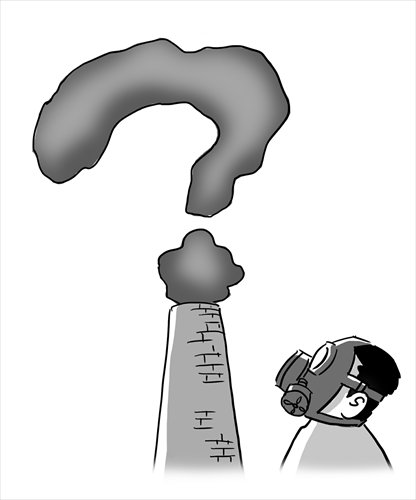Delhi anti-pollution efforts could look to Beijing’s stricter standards

Illustration: Liu Rui/GT
Air pollution has been grabbing headlines in both India and China recently. In Delhi and Beijing, both governments are under immense pressure to tackle the issue at the highest level.
Although the level of urgency is the same in both countries, the level of seriousness shown by the authorities varies. While Beijing has put in place several stringent measures to curb air pollution in its capital both in the short and long term, the Indian government seems to be living in denial.
While the former has installed monitoring stations that provide live, downloadable data throughout the year, the latter's latest move to "screen" smog data through the Central Pollution Control Board before publishing it can only cost Delhi and India in the long run.
Beijing has not only adopted policies to introduce cleaner fuel, incentivize the purchase of electric vehicles, phase out older vehicles, and restrict the number of vehicles in the city among others, but also announced that it would shut down at least 300 polluting factories and cap coal and steel production.
In India, the authorities are still struggling to strike a balance between environmental regulations and a healthy business environment. The Delhi government led by the Aam Aadmi Party (AAP), the newest addition to politics in India, stated that medium- and small-scale industries would not need to procure a No Objection Certificate from the Pollution Control Board. Moreover, the decision-making over Delhi's future is split between local and central governments, ruled by two different political parties.
India could definitely take a leaf out of China's book. India cannot compromise on providing pollution data to the public. Rather than centralizing the whole system, it should concentrate on making all data accessible to the public that is at most risk. Moreover, the authorities need to start gearing up for emergency action on high pollution days, something that is yet to be recognized as a priority.
Delhi has already introduced the much cleaner compressed natural gas for buses and rickshaws, but private vehicles mostly use highly polluting diesel and petrol. If incentives could be provided to consumers for switching to public transport and to cleaner fuels and electrical vehicles, this would have a huge positive impact on the air quality.
For this to be effective, the government has to phase out subsidies on diesel faster. Although it might be difficult to curb the freedom to buy vehicles, emissions standards could be upgraded to Euro VI/VII standards and the number of vehicles in the city would have to be limited, particularly during peak hours.
In Delhi, the charges for vehicle registration are quite high, which prompts many residents of the capital to register their vehicles in the cheaper satellite town, Gurgaon, effectively a part of the National Capital Region but administratively a part of the neighboring state, Haryana. Such gaps have to be addressed.
India needs to put in place stricter regulations for coal power plants that constitute one of the biggest contributors to pollution. Although the government is trying to walk a tightrope in terms of the conflict between developmental and environmental concerns, setting emissions standards is the only feasible solution at this stage.
One important point that India needs to focus on is that air pollution is a concern all over the country and not just in the capital. Therefore, instead of investing all resources in Delhi, it should also divert some of its attention to the other metropolitan cities, and smaller cities and towns that have high levels of pollution, which essentially calls for a National Action Plan.
Through strong parliamentary and assembly legislations as well as the bureaucratic will for implementation, all the loopholes pervading the Indian environmental decision-making could be plugged.
The author is a visiting (Erasmus Mundus) PhD Scholar at the Leiden University Institute for Area Studies (LIAS), the Netherlands. opinion@globaltimes.com.cn